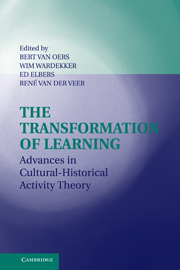Book contents
- Frontmatter
- Contents
- List of Contributors
- Preface
- INTRODUCTION
- SECTION ONE TENETS OF ACTIVITY THEORY
- Introduction to Section One: Exploring Vygotsky's Legacy: The Meaning of Mediation
- 2 Multiple Readings of Vygotsky
- 3 Exploring the Links between External and Internal Activity from a Cultural-Historical Perspective
- 4 Reflections on Points of Departure in the Development of Sociocultural and Activity Theory
- 5 Language in Cultural-Historical Perspective
- 6 The Formation Experiment in the Age of Hypermedia and Distance Learning
- 7 Constructivism and Meaning Construction
- 8 Subject, Subjectivity, and Development in Cultural-Historical Psychology
- SECTION TWO IDENTITY, DIVERSITY, AND INCLUSION
- SECTION THREE DYNAMICS OF ACTIVITY AND THE VARIATIONS OF LEARNING
- Index
- References
8 - Subject, Subjectivity, and Development in Cultural-Historical Psychology
Published online by Cambridge University Press: 25 August 2009
- Frontmatter
- Contents
- List of Contributors
- Preface
- INTRODUCTION
- SECTION ONE TENETS OF ACTIVITY THEORY
- Introduction to Section One: Exploring Vygotsky's Legacy: The Meaning of Mediation
- 2 Multiple Readings of Vygotsky
- 3 Exploring the Links between External and Internal Activity from a Cultural-Historical Perspective
- 4 Reflections on Points of Departure in the Development of Sociocultural and Activity Theory
- 5 Language in Cultural-Historical Perspective
- 6 The Formation Experiment in the Age of Hypermedia and Distance Learning
- 7 Constructivism and Meaning Construction
- 8 Subject, Subjectivity, and Development in Cultural-Historical Psychology
- SECTION TWO IDENTITY, DIVERSITY, AND INCLUSION
- SECTION THREE DYNAMICS OF ACTIVITY AND THE VARIATIONS OF LEARNING
- Index
- References
Summary
INTRODUCTION
One of the main goals of this chapter is to put Vygotsky in a perspective that differs from currently dominant interpretations of his work in Western psychology. Before I offer a rather different interpretation, however, I would like to comment on certain trends in the sociocultural approach to the interpretation of Vygotsky's works.
First, it is characteristic to separate Vygotsky from his historical and theoretical context – the Russian Revolution, Soviet psychology, and the influence of Marxism on Vygotsky's theoretical representations. When I refer to the influence of Marxism on his view about psychology, I am not suggesting any kind of linear relation between more philosophical Marxist categories and principles and Vygotsky's work. On the contrary, I would like to emphasize Vygotsky's creativity in the way he adopted Marxism in his psychological work. Marxism was present in Vygotsky's thinking – above all, in his general representation of psychological phenomena.
Second, at this moment some prevailing interpretations of Vygotsky appear as “correct” and updated, for example, those given by Bruner, Kozulin, Wertsch, and van der Veer. This trend has led some psychologists to consider Vygotsky's original works as old-fashioned and to reinterpret his views in the light of the currently fashionable narrative, semiotic, or discursive approaches. Because Vygotsky's work was unfinished, contradictory, and irregular, it allows a variety of interpretations, of which we have not seen the last.
- Type
- Chapter
- Information
- The Transformation of LearningAdvances in Cultural-Historical Activity Theory, pp. 137 - 154Publisher: Cambridge University PressPrint publication year: 2008
References
- 1
- Cited by



